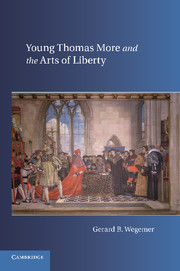Book contents
- Frontmatter
- Contents
- List of Illustrations
- Acknowledgments
- List of Abbreviations
- 1 Young Thomas More
- 2 Fashioning Peace and Prosperity
- 3 Cicero's and More's First Citizens
- 4 More's Earliest Views of Humanitas, Libertas, and Respublica, 1500–1506
- 5 More's Life of Pico della Mirandola (c. 1504–1507)
- 6 More's 1509 Coronation Ode
- 7 Political Poems of 1509–1516
- 8 Richard III
- 9 Utopia
- 10 The Un-Utopian Thomas More Family Portrait
- 11 The Arts of Liberty
- Works Cited
- Index
1 - Young Thomas More
Why Do Peace and Prosperity Require Arts of Humanitas?
Published online by Cambridge University Press: 25 October 2011
- Frontmatter
- Contents
- List of Illustrations
- Acknowledgments
- List of Abbreviations
- 1 Young Thomas More
- 2 Fashioning Peace and Prosperity
- 3 Cicero's and More's First Citizens
- 4 More's Earliest Views of Humanitas, Libertas, and Respublica, 1500–1506
- 5 More's Life of Pico della Mirandola (c. 1504–1507)
- 6 More's 1509 Coronation Ode
- 7 Political Poems of 1509–1516
- 8 Richard III
- 9 Utopia
- 10 The Un-Utopian Thomas More Family Portrait
- 11 The Arts of Liberty
- Works Cited
- Index
Summary
[Wisdom is] the skilled artisan of life …, her voice is for peace, and she summons all mankind to concord.
Seneca, Epistulae 90.26–27[Liberal] arts were devised for the purpose of fashioning [fingerentur] the minds of the young according to humanitas and virtue.
Cicero, De Oratore 3.58Humanitas, or the idea of man, [is that] according to which man is fashioned [effingitur] … as Plato says.
Seneca, Epistulae 65.7“Work out your own ideas and sift your thoughts so as to see what conception and idea of a good person they contain”; otherwise you can end up as a “Caesar [who] overturned all the laws, human and divine, to achieve for himself a principate fashioned [finxerat] according to his own erroneous opinion.”
Cicero, De Officiis 3.81, 1.26In 1515, as part of their plan for international peace, Thomas More and Erasmus both called for a renaissance – a “rebirth” – of the “so-called liberal studies.” That “so-called” referred to Seneca's famous statement: “Hence you see why ‘liberal studies’ are so called: because they are studies worthy of the free. But there is only one really liberal study, that which gives a person his liberty. It is the study of wisdom, and that is lofty, brave, and great-souled.” In calling for this renaissance, they were agreeing with their classical predecessors that education in the “liberal arts,” or what Cicero often called the studia humanitatis, is the best path “to lead the state in peace,” because “the fostering of a virtuous and educated citizenry provides the key” to peace and liberty.
- Type
- Chapter
- Information
- Young Thomas More and the Arts of Liberty , pp. 1 - 22Publisher: Cambridge University PressPrint publication year: 2011



